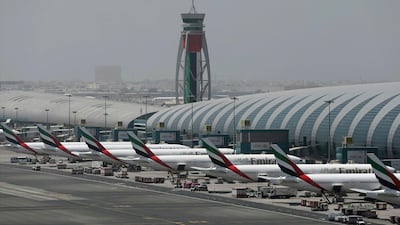The UAE, the region's transit and financial hub, halted all passenger flights starting from March 25 for two weeks, as the Covid-19 outbreak plunges the global aviation industry into a deepening crisis.
In response to the UAE's decision, Abu Dhabi-based Etihad Airways will halt all its flights to, from, and via the UAE capital on March 25 for an initial 14 days, subject to further directives from the authorities, it said in a statement on Monday.
"These are unprecedented times and unprecedented decisions are being made by governments, authorities and companies, including Etihad, to contain the spread of the coronavirus and to help minimise its effects around the world," Tony Douglas, chief executive of Etihad Aviation Group said.
The state-owned carrier, which is in the midst of a five-year turnaround plan to reverse annual losses, said that it can cope with the temporary halt in its passenger operations.
The national airline is "confident that we’re well prepared to weather the commercial and operational impact this suspension will have on our services," Mr Douglas said.
Etihad Airways is taking measures to reduce costs and conserve cash as it deals with the impact of the Covid-19 outbreak, Mr Douglas told The National in an interview on Sunday.
The UAE is home to Abu Dhabi's Etihad Airways, Dubai-based Emirates, discount carrier Flydubai and the Middle East's biggest low-cost carrier, Air Arabia. Flydubai also said it will halt operations from March 26 at 23:59 until April 9. Prior to the suspension, it will operate flights to five destinations including Bucharest and Kabul.
"Clearly this is an unprecedented situation for the aviation industry, and indeed the world, but Flydubai is as prepared as it can be," flydubai chief executive Ghaith Al Ghaith said.
The carrier has reallocated resources to "critical business needs" including customer care and large-scale maintenance of its grounded fleet.
"We are seeing this period as an opportunity to recalibrate our business and our unrelenting focus is now on laying the groundwork, together, for a smooth full return to service in due course," Mr Ghaith said.
The airline will split its fleet, using its engineering and maintenance bases at Dubai International Airport and Al Maktoum International Airport.
Seeing "strong" global cargo demand, the airline is expanding its freight operations and is currently considering the option of cargo in its cabin in addition to the belly-hold of its jets.
Dubai-based Emirates also said it will suspend most passenger flights for two weeks starting March 25, following the UAE's directives, but continues to operate freighter flights.
The coronavirus outbreak is likely to have a deep and long-lasting impact on the global aviation landscape, analysts say.
"This unprecedented challenge necessitates unprecedented responses," John Strickland, London-based independent aviation consultant, said by email. "The UAE depends ... on trade and tourism but this action is not surprising."
Airlines around the world are making deeper and more dramatic cuts to their flight schedules or cancelling operations as more countries announce new air travel restrictions. Last week, global airline capacity shrank 12.4 per cent on the same period a year ago, according to travel data provider OAG. Global airline capacity could drop by 25 per cent to 35 per cent year-on-year in 2020, assuming the spread of the virus slows by the end of June and passenger demand subsequently returns, Moody's Investor Services said in a report.
"Aviation of the future will be different, there will be failures and consolidation," Mr Strickland said. "Total capacity is likely to be considerably smaller in line with reduced global economic activity."
The knock-on effect from the coronavirus outbreak battering the aviation industry has taken will widen to include related sectors such as hotels, car rentals, airport retail stores and food and beverage outlets, Mark Martin, founder and chief executive at Martin Consulting, said.
The aviation industry's eventual recovery from the impact of the Covid-19 crisis could take another 18 to 24 months to make up for revenues losses and shattered demand, Mr Martin said.
Government, plane leasing companies, insurance firms and financial institutions should collaborate to work out a structured relief plan for airlines, Mr Martin said.
"Everyone needs to come together: if your aircraft is not flying for months, then you're not making revenue, if [you're] not making revenue, then how on earth will you pay for lease rentals?" he said.
Iata estimates global carriers will need about $200 billion (Dh734.5bn) in state aid to survive the crisis.
"While weaker airlines may be pushed to default, we do not expect even the strongest companies to emerge unscathed," Moody's said on March 20.
Airlines are taking measures to deal with liquidity problems.
Kuwait's Jazeera Airways said it will suspend its previous recommendation to distribute dividends to shareholders for the financial year ending December 31, 2019, as part of measures to "enable it to weather through current challenges and protect the business in the long-term," it said on Monday.






















